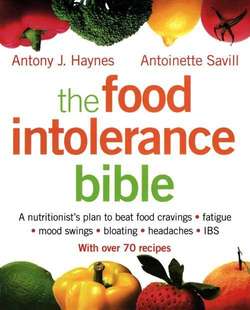Читать книгу The Food Intolerance Bible: A nutritionist's plan to beat food cravings, fatigue, mood swings, bloating, headaches and IBS - Antoinette Savill, Antoinette Savill - Страница 13
Proof of Food Intolerance
ОглавлениеThere have been observations that food can elicit adverse reactions since the days of Hippocrates. As you will find out in Chapter 1, there are potentially a vast range of symptoms that can be caused by food intolerance reactions. These can be divided into two broad categories: physical (especially digestive) and mental/emotional/behavioural. Since the nature of the symptoms is so diverse, there could potentially be other contributory factors, too, and it is this lack of specificity which has cast some doubt about the phenomenon of food intolerance.
So, can you prove that food intolerance is really the cause of your symptoms? In many cases, you may not need any more proof other than the fact that when you avoid a food you do not get a symptom, but when you eat it you do. In other cases you may have a suspicion about a certain food and therefore an approach which involves elimination/reintroduction – removing the suspected food from your diet and later on reintroducing it into your diet – may serve a useful purpose. (This is not a good thing to do if you have a true food allergy, however). Alternatively, you may wish to implement the pulse-testing method, which will be described later.
However, there are some people who have a potential for multiple food intolerances, which makes an elimination diet and reintroduction difficult to implement. In these cases, a test to tell you which foods you react to would be very useful.
Most people in this situation want to have a firm diagnosis of what is causing, or contributing to, their problems. Equally, practitioners also want to have some certainty about what is wrong with their patients so they can make the most apt recommendations. To this end, a degree of proof is always useful – and in Chapter 2 you will find descriptions of a number of accurate tests to help you gather this proof. However, simply testing for immune reactions does not prove in itself that this is the cause of your symptoms; there can be a number of foods to which you are intolerant that cause you no symptoms at all. This is where the avoidance of these foods and a monitoring of symptoms can ‘prove’ the point nicely. The reintroduction of the offending foods should trigger, in a way that can be easily reproduced, your symptoms.
There have not been many large studies conducted to ‘prove’ how food intolerance affects various aspects of health. However, there have been studies that show very strong evidence of cause and effect between food intolerance and Irritable Bowel Syndrome (IBS). Indeed, one complaint a medical doctor friend of mine raised about this issue was that he wasn’t particularly aware of any ‘decent’ studies showing that food intolerances really were to blame for a number of symptoms they are claimed to cause. One of the very good reasons for this is that typical medical studies (randomized, placebo-controlled, double-blind studies) are designed to test a drug against a sign or symptom. They are not designed to evaluate the effects of a number of different agents (i.e. foods) on multiple variables (i.e. symptoms). Furthermore, in the case of food intolerance, since the technology for testing is relatively new and because there is no one single test that will accurately identify every single food to which an individual may react, there is difficulty in verifying exactly what foods should be assessed.
